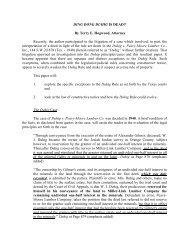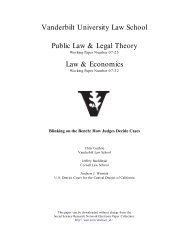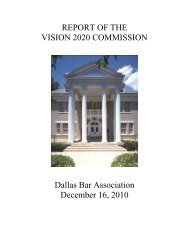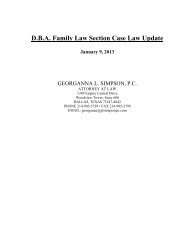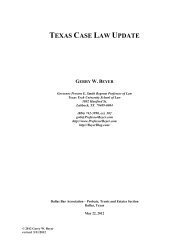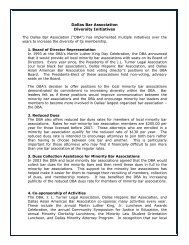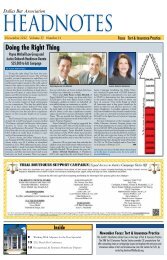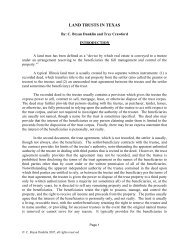subordination, nondisturbance and attornment agreements
subordination, nondisturbance and attornment agreements
subordination, nondisturbance and attornment agreements
You also want an ePaper? Increase the reach of your titles
YUMPU automatically turns print PDFs into web optimized ePapers that Google loves.
C. Subrogation <strong>and</strong> its Effect On Priority.A real estate development often begins with a l<strong>and</strong> loan providing funds for the initialacquisition, followed by a construction loan to fund construction of the improvements, followedby a permanent loan placed on the property after it has been leased <strong>and</strong> tenants are in possession<strong>and</strong> paying rent. Fortunately for the permanent lender, through the doctrine of subrogation, thepriority of the permanent lender’s lien will often relate back to a date many years before the dateof the new loan.The doctrine of subrogation is an equitable doctrine that, for purposes relevant to thisdiscussion, allows the inception of a mortgagee's priority to relate back to a date earlier than thedate the mortgage was recorded. Under this doctrine, one who advances funds to pay off a priorlien is allowed to st<strong>and</strong> in the shoes of the prior lien holder. Blaylock v. Dollar Inns of America,Inc., 548 S.W.2d 924 at 933 (Tex. Civ. App.—Tyler 1977, n.w.h.), rev'd on other grounds, 576S.W.2d 794 (Tex. 1978); Texas Commerce Bank N.A. v. Liberty Bank, 540 S.W.2d 554 (Tex.Civ. App.—Houston [14th Dist] 1976, no writ); Providence Institution for Savings v. Sims, 441S.W.2d 516 (Tex. 1969). In Blaylock, the court held that even absent a writing to that effect, alender advancing money that is used to pay off a prior lien will be subrogated to the priorlender's rights:It has long been the law of this state that one who has advanced money with anunderst<strong>and</strong>ing or under circumstances giving rise to an underst<strong>and</strong>ing that hisadvancement shall be secured by a first lien upon the property is not a merevolunteer <strong>and</strong> should be subrogated to the prior lien so discharged. Blaylock, 548S.W.2d at 933.Thus, for purposes of determining the relative priority of a lease <strong>and</strong> a mortgage, simplydetermining that the tenant’s possession predated a mortgage may not be enough to know withcertainty that the lease is superior to the mortgage. Further inquiry is necessary to determinewhether a prior mortgage existed on the property <strong>and</strong> whether the prior mortgage was paid withthe proceeds of the indebtedness secured by the subsequent mortgage.Med Center Bank v. Fleetwood, 854 S.W.2d 278 (Tex App.—Austin 1993, writ denied)contains an excellent discussion of the impact of subrogation on the relative priorities of a lease<strong>and</strong> a mortgage. In 1984, Fleetwood <strong>and</strong> two other individuals formed a joint venture toconstruct a shopping center. After the shopping center was completed, but before permanentfinancing had been obtained, Fleetwood sold his interest in the joint venture for cash <strong>and</strong> apromissory note (the “Fleetwood Note”) secured by a mortgage lien covering the shoppingcenter. The parties also entered into a lease of two adjacent tracts of l<strong>and</strong> whereby Fleetwoodwas granted a 55% undivided leasehold interest in the adjacent tracts for a term of 99 years. Thelease was expressly subordinate to Fleetwood’s lien. Subsequently, Nationwide advancedpermanent financing to the joint venture for the shopping center. The permanent financing wassecured by a mortgage covering the shopping center <strong>and</strong> one of the adjacent tracts (called “TractA” in the opinion). Fleetwood expressly subordinated the lien securing the Fleetwood Note tothe Nationwide mortgage. The closing of the permanent loan triggered a prepayment obligationunder the Fleetwood Note, which the joint venture was unable to pay. After Fleetwood declaredD-SNDAs 11-10-07 - 6 -




